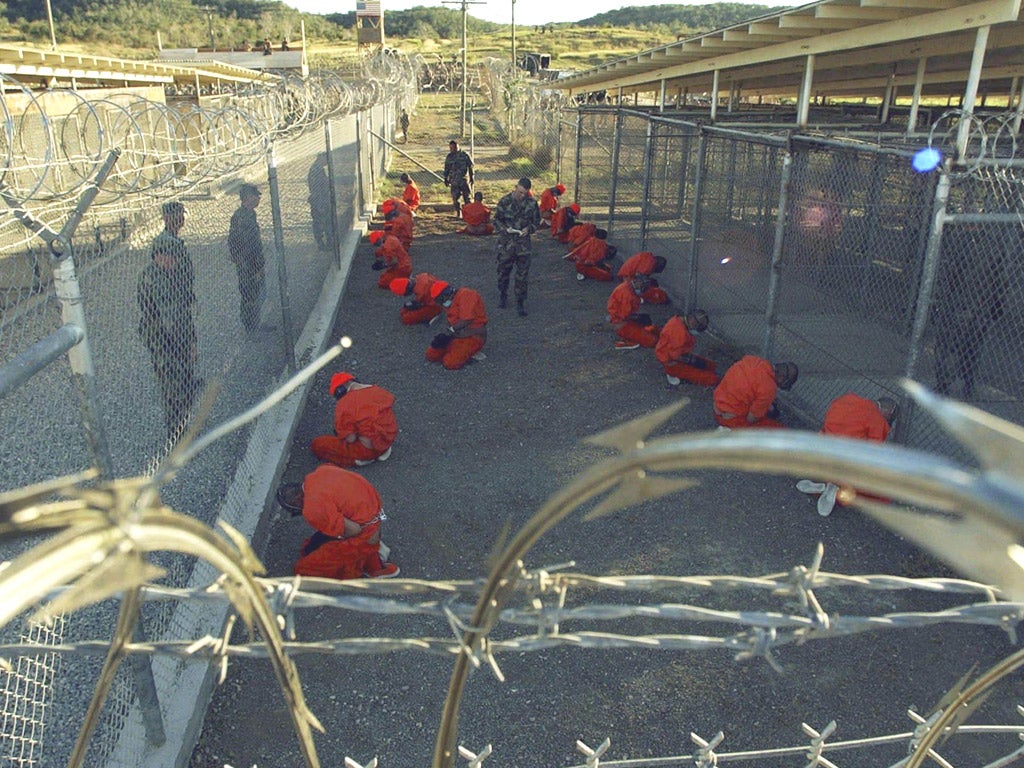‘No longer in our interest’ to disclose how many Guantanamo inmates are on hunger strike, US military says
The announcement comes as two Algerian men held at the camp for a decade are released without charge in a revived push towards gradual closure

Your support helps us to tell the story
From reproductive rights to climate change to Big Tech, The Independent is on the ground when the story is developing. Whether it's investigating the financials of Elon Musk's pro-Trump PAC or producing our latest documentary, 'The A Word', which shines a light on the American women fighting for reproductive rights, we know how important it is to parse out the facts from the messaging.
At such a critical moment in US history, we need reporters on the ground. Your donation allows us to keep sending journalists to speak to both sides of the story.
The Independent is trusted by Americans across the entire political spectrum. And unlike many other quality news outlets, we choose not to lock Americans out of our reporting and analysis with paywalls. We believe quality journalism should be available to everyone, paid for by those who can afford it.
Your support makes all the difference.The US military will no longer make the number of inmates on hunger strike at Guantanamo Bay public knowledge, a spokesman has revealed, eliminating what had become an unofficial guage of conditions at the secretive military prison.
The announcement came shortly before two of the 164 inmates were released without charge after spending over a decade each in the prison. The vast majority of those still in the camp have not faced any charges.
Men held at Guantanamo Bay have used hunger strikes to protest over conditions since shortly after the prison opened in January 2002. The US has long disclosed how many are refusing to eat and whether they meet military guidelines to be force fed.
Officials at the prison have now deemed it no longer in their interest to publicly disclose the information however, said Navy commander John Fiolstrat, a spokesman for the military's Joint Task Force-Guantanamo.
“JTF-Guantanamo allows detainees to peacefully protest, but will not further their protests by reporting the numbers to the public,” Filostrat said in an e-mail.
“The release of this information serves no operational purpose and detracts from the more important issues, which are the welfare of detainees and the safety and security of our troops.”
President Barack Obama had vowed to close the prison upon taking office but has been thwarted by Congress, which imposed restrictions on transfers and releases.
Obama earlier this year appointed two special envoys to work with Congress and other countries on a renewed attempt to slowly clear the prison. Clifford Sloan, the State Department's Special Envoy for Guantanamo Closure, called the releases to Algeria a sign of progress.
Over the years, the US has repatriated 14 prisoners from Guantanamo to Algeria, including two earlier this year. Of the total, two were convicted of involvement with a foreign terrorist organisation and only one remains in prison, according to the State Department.
Both prisoners, Djamel Saiid Ali Ameziane and Belkecem Bensayah, had resisted being returned to Algeria because of fears they might face persecution and further imprisonment, according to their lawyers, who had urged President Barack Obama's administration to send them elsewhere.
Wells Dixon, a lawyer for Mr Ameziane, said the decision to send him to Algeria showed a “callous disregard for his human rights,” since he had a credible fear of persecution, a claim that officials rejected.
“Given that the US Government well knows that Djamel could have, like dozens of detainees before him, been resettled in a safe, alternate country, it is particularly outrageous that the US would forcibly return him to a risk of harm in Algeria,” said Dixon, a lawyer with the New York-based Center for Constitutional Rights.
The Miami Herald reported that as of Monday, when the statistics were apparently released for the last time, that there were 15 men on hunger strike in the prison, up from 11 in mid-November.
A mass hunger strike protest over conditions this year peaked in July at 106 prisoners.
Join our commenting forum
Join thought-provoking conversations, follow other Independent readers and see their replies
Comments